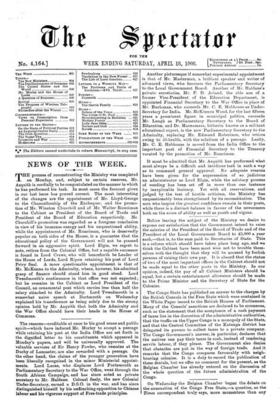The reasons—creditable at once to his good sense and public
spirit—which have induced Mr. Morley to accept a peerage while retaining his post at the India Office are set forth in the dignified letter to his constituents which appeared in Monday's papers, and will be universally approved. The valuable services of Sir Henry Fowler, who remains at the Duchy of Lancaster, are also rewarded with a peerage. On the other hand, the claims of the younger generation have been liberally recognised in the minor Ministerial appoint- ments. Lord Lucas, who displaces Lord Portsmouth as Parliamentary Secretary to the War Office, went through the South African Campaign, and has since acted as private secretary to Mr. Haldane. Colonel Seely, the new Colonial Under-Secretary, earned a D.S.O. in the war, and has since distinguished himself by his unflinching opposition to Chinese labour and his vigorous support of Free-trade principles. Another picturesque if somewhat experimental appointment is that of Mr. Ma,sterman, a brilliant speaker and writer of advanced views, who becomes the Parliamentary Secretary to the Local Government Board. Another of Mr. Haldane's private secretaries, Mr. F. D. Acland, the able son of a former Vice-President of the Education Department, is appointed Financial Secretary to the War Office in place of Mr. Buchanan, who succeeds Mr. C. E. Hobbouse as Under. Secretary for India. Mr. McKinnon Wood, for the last fifteen years a prominent figure in municipal politics, succeeds Mr. Lough as Parliamentary Secretary to the Board of Education, and Dr. Macnamara, hitherto known as a militant educational expert, is the new Parliamentary Secretary to the Admiralty, replacing Mr. Edmund Robertson, who retires owing to ill-health, with the solatium of a peerage. Lastly, Mr. C. E. Hobbouse is moved from the India Office to the important post of Financial Secretary to the Treasury vacated by the promotion of Mr. Runciman.






































